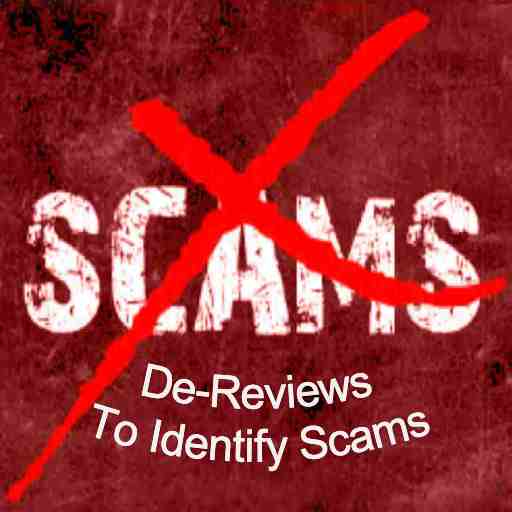If you've landed on this page, you were most likely trying to access one of our older review articles on De-Reviews.com. That content has been removed — and for good reason.
If you found this page while searching for reviews of certain websites, apps, products, or other online activities, please note that those were confirmed scams. Those fraudulent sites or services have been taken down, are no longer accessible, or have vanished from the internet. So, we’ve removed the original review posts related to those now-defunct websites, apps, products, or online activities.
- Why You’re Seeing This Page Instead of a Review?
- Why Did We Remove Those Scam Pages?
- How To Get Refund From Scams?
- What Should You Do Next?
- Stay One Step Ahead of Online Scams:
- Shardlt.com Review To Check If It Is Scam Or Genuine
- Mrheater-Sale Club Review: Mrheater-Sale Club Scam or Legit?
- Goodebikeshop Top Review, Is It Scam Or Genuine
Why You’re Seeing This Page Instead of a Review?
At De-Reviews.com, we are committed to helping our readers stay safe from online fraud. We publish scam warnings and investigative reports on fake websites, phishing messages, fraudulent products, and other deceptive online practices. However, many of these scams have a short lifespan. Once exposed, scammers often shut down the site or abandon their campaign — and that’s exactly what has happened in the cases you were trying to read about.
Rather than leave broken or outdated links on our site, we’ve chosen to remove such pages to keep our content current, relevant, and clean. Outdated scam reviews not only take up unnecessary space but may also confuse readers if the website in question no longer exists or now shows unrelated or legitimate content.
Why Did We Remove Those Scam Pages?
There are several reasons why certain scam review pages have been taken down from our platform:
- The scam websites have been permanently shut down or are no longer reachable.
- The fraudulent products or services are no longer being advertised or sold.
- The domains might now redirect to unrelated or even legitimate websites.
- We prefer to focus our resources on current, active scams to keep you safer.
Even though the page you were looking for isn’t available anymore, now you know that the website, app, product, or online activity you were searching for was a scam.

But don’t worry — there is still a little change to get a refund from a scam.
How To Get Refund From Scams?
It's difficult to get a refund from scams. But, here are some ways you can try to get your money back.
Firstly, avoid doing further transactions with them. We advise you to talk to the seller and tell them calmly about your problem. Also, keep records of everything related to your order, like tracking number, postal details, chats, pictures, emails, and many more.
In the case if you don't receive what you purchased even after contacting the seller, then you should contact your bank or credit card company and ask them to help you with a refund. However, if you have used PayPal, then you should open a dispute via your PayPal account and contact them.
In the case, if you have purchased a physical item and received the wrong one, then you should contact the postal service for tracking info. You should get the detail like the weight of item that you got, which might be less or different than what you ordered. Show this proof to your bank, credit card company, or PayPal to ask for a refund.
Likewise, check your bank accounts or credit card statements to stop any charges you didn't make. If you see any suspicious charges, cancel your credit card.
If nothing works, and you end up losing lots of money, then you should contact the legal expert or a group that helps people on such situation.
You should also report doubtful sites to concerned authorities like Better Business Bureau, FBI, FTC, or similar authorities in your country.
But remember, these steps may not work for all because it depends on where you live, which method you used for the payment, and the rules of your chosen payment method.
For more details, you can check our “How To Get A Refund” article.
What Should You Do Next?
Here are some steps you can take to continue your search or find the latest scam updates:
Want to verify a suspicious site? Use our Scam Search Tool available on our “Contact Us” page to check whether a website is flagged as a scam.
Found something suspicious? Contact us — if it turns out to be a new scam, we’ll investigate and possibly feature it on our site to warn others.
Looking for recent scam alerts? Visit our Home Page to browse the latest scam reports and safety tips.
Stay One Step Ahead of Online Scams:
Online scams evolve fast. Scammers often disappear once they're exposed, only to come back with new tricks under different names. That's why it's so important to stay informed. Whether it's a fake website offering unbelievable offers and discounts, or a phishing message disguised as a delivery alert, always double-check before you click.
At De-Reviews.com, we’re committed to making the internet a safer place by uncovering scams and spreading awareness. We’re trusted by thousands of readers who rely on us for honest, up-to-date scam alerts.
Stay smart. Stay safe. And always verify before you trust.
The De-Reviews.com Team — Trusted by thousands of readers every day!
Good Luck!


Leave a Reply